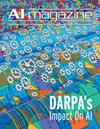Evaluation of an Arabic Chatbot Based on Extractive Question-Answering Transfer Learning and Language Transformers
IF 2.5
4区 计算机科学
Q3 COMPUTER SCIENCE, ARTIFICIAL INTELLIGENCE
引用次数: 2
Abstract
Chatbots are programs with the ability to understand and respond to natural language in a way that is both informative and engaging. This study explored the current trends of using transformers and transfer learning techniques on Arabic chatbots. The proposed methods used various transformers and semantic embedding models from AraBERT, CAMeLBERT, AraElectra-SQuAD, and AraElectra (Generator/Discriminator). Two datasets were used for the evaluation: one with 398 questions, and the other with 1395 questions and 365,568 documents sourced from Arabic Wikipedia. Extensive experimental works were conducted, evaluating both manually crafted questions and the entire set of questions by using confidence and similarity metrics. Our experimental results demonstrate that combining the power of transformer architecture with extractive chatbots can provide more accurate and contextually relevant answers to questions in Arabic. Specifically, our experimental results showed that the AraElectra-SQuAD model consistently outperformed other models. It achieved an average confidence score of 0.6422 and an average similarity score of 0.9773 on the first dataset, and an average confidence score of 0.6658 and similarity score of 0.9660 on the second dataset. The study concludes that the AraElectra-SQuAD showed remarkable performance, high confidence, and robustness, which highlights its potential for practical applications in natural language processing tasks for Arabic chatbots. The study suggests that the language transformers can be further enhanced and used for various tasks, such as specialized chatbots, virtual assistants, and information retrieval systems for Arabic-speaking users.基于抽取式问答迁移学习和语言转换的阿拉伯语聊天机器人评价
聊天机器人是一种能够理解自然语言并对其做出反应的程序,它既能提供信息,又能吸引人。本研究探讨了在阿拉伯聊天机器人上使用变形器和迁移学习技术的当前趋势。所提出的方法使用了来自AraBERT、CAMeLBERT、AraElectra- squad和AraElectra (Generator/Discriminator)的各种变压器和语义嵌入模型。评估使用了两个数据集:一个有398个问题,另一个有1395个问题和来自阿拉伯语维基百科的365,568个文档。我们进行了大量的实验工作,通过使用置信度和相似性指标来评估人工制作的问题和整套问题。我们的实验结果表明,将变压器架构的功能与抽取式聊天机器人相结合,可以为阿拉伯语问题提供更准确和上下文相关的答案。具体来说,我们的实验结果表明,AraElectra-SQuAD模型始终优于其他模型。在第一个数据集上的平均置信度得分为0.6422,平均相似度得分为0.9773;在第二个数据集上的平均置信度得分为0.6658,平均相似度得分为0.9660。研究得出结论,AraElectra-SQuAD表现出卓越的性能、高置信度和鲁棒性,这凸显了其在阿拉伯聊天机器人自然语言处理任务中的实际应用潜力。该研究表明,语言转换器可以进一步增强并用于各种任务,例如专门的聊天机器人、虚拟助手和面向阿拉伯语用户的信息检索系统。
本文章由计算机程序翻译,如有差异,请以英文原文为准。
求助全文
约1分钟内获得全文
求助全文
来源期刊

Ai Magazine
工程技术-计算机:人工智能
CiteScore
3.90
自引率
11.10%
发文量
61
审稿时长
>12 weeks
期刊介绍:
AI Magazine publishes original articles that are reasonably self-contained and aimed at a broad spectrum of the AI community. Technical content should be kept to a minimum. In general, the magazine does not publish articles that have been published elsewhere in whole or in part. The magazine welcomes the contribution of articles on the theory and practice of AI as well as general survey articles, tutorial articles on timely topics, conference or symposia or workshop reports, and timely columns on topics of interest to AI scientists.
 求助内容:
求助内容: 应助结果提醒方式:
应助结果提醒方式:


